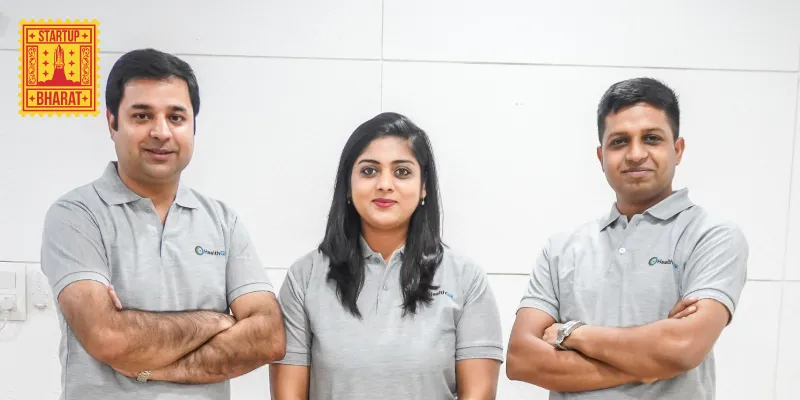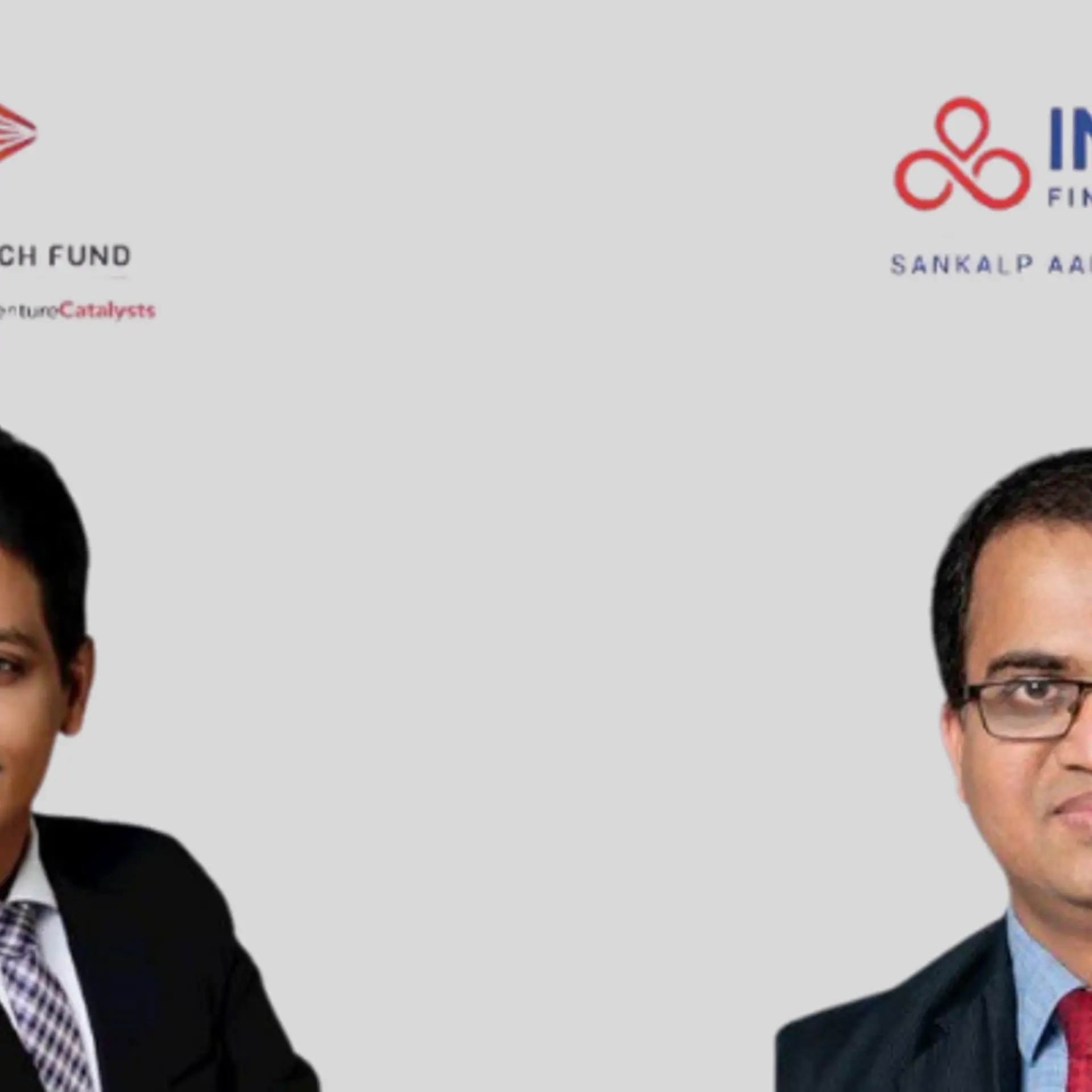[Startup Bharat] Bhopal-based EHR platform HealthQik raises $250,000 in seed round
Electronic health records startup HealthQik was founded in 2016 in Bhopal to connect patients with healthcare providers. In a conversation with YourStory, the founders detail their plans of on-boarding more doctors to bridge the critical demand-supply gap in India.
Electronic health record (EHR) startup HealthQik has raised seed funding of $250,000 (Rs 1.7 crore) from two angel investors, Virendra Prakash Sharma (from Indonesia) and Gagan Lamba (from the US). Founded in 2016 by Abhinav Sehgal, Manish Pandey, and Ishita Rastogi, and incubated at B-Nest Incubation Centre in Bhopal, HealthQik is a website and mobile platform connecting patients with healthcare providers. The cloud-based comprehensive EHR platform helps keep health records online, schedule doctor appointments, and analyse medical data.
Abhinav Sehgal (31) had been working as a consultant in the US healthcare industry for over a decade when he realised the challenges patients faced in India due to lack of technology penetration in healthcare. “HealthQik was an idea that came with an intent to streamline processes,” Abhinav says.
HealthQik brings interoperability where patients, doctors, clinics, pharmacies, hospitals, and labs can connect with each other so a patient can receive quality healthcare services that are remotely accessible anytime, anywhere. He, along with his wife, Ishita Rastogi (an LSE graduate and former McKinsey employee), shared the idea with friend Manish, 34, while visiting India. Both Manish and Abhinav had worked together since 2012 on delivering tech solutions to multiple clients in the US and India. The three founders decided to launch HealthQik in 2016.
“At present, we have a presence mainly in Tier II cities such as Bhopal, Lucknow, and Dehradun, with over 200 providers on board. We have 50,000+ patients registered and over 60,000 appointments have been booked through our platform so far,” says Ishita, 29.

The HealthQik team lets doctors, patients, clinics, hospitals, pharmacies, and labs connect with each other.
How does HealthQik work?
So how does the EHR platform work exactly? “We have a direct, feet-on-street approach in each city of operation with executives going personally to meet doctors in clinics and hospitals, and explaining the benefits of using HealthQik,” Manish explains.
Doctors need to sign up on the platform and are directed to a dashboard to schedule meetings, appointments, upload health records, and get access to this data from anywhere. The mobile application ensures that doctors, clinics, and other healthcare providers are able to manage records and appointments, and patient data on the go.
“There are a number of benefits to the doctors. They get access to patient records from inpatient and remote locations, give more reliable e-prescriptions, and interface with labs, diagnostic centres and pharmacies for inclusive interoperable ecosystem. They can send e-prescriptions electronically to the lab/pharmacy. This minimises paper-based filing/reporting while maximising accountability and data security,” he adds.
From the patient’s point of view, HealthQik can store all of their health records at one place. It supports patient workflow management for different scenarios such as out-patient department (OPD), in-patient department (IPD), lab, diagnostics, pharmacy, etc. The database enables patients to find the nearest doctor from their place of stay, resulting in instant booking and tracking of appointments, important reminders, dates, and dosage.

The three founders of HealthQik: Abhinav, Ishita, and Manish.
Utilising funds for growth
“We had bootstrapped HealthQik to a level where our product had started getting acceptance from the doctors. We soon realised that we’ll need funds for expansion and started reaching out to potential investors. In the hunt for funds, we met HNIs Virendra and Gagan (a senior executive of a global company in the US). They loved our founding team, domain expertise, technology background, passion, and vision of how HealthQik can play a crucial role in saving human lives by bringing preventive, predictive and personalised care,” Abhinav says.
On their plans for the funding raised, Ishita explains, “We wish to utilise the funds to maximise our ongoing momentum, expand our offerings to additional healthcare segments, and continue the development of product to reach a wider audience in India.”
Bridging the gaps in healthcare
A report states that the global EHR market was valued at $25.4 billion in 2018 and is expected to reach $36.0 billion by 2024, growing at a CAGR of 6.2 percent during the forecast period. This growth is owing to increase in the adoption of cloud-based EHR software, surge in number of chronic diseases, and growth in geriatric population.
In India, the healthcare informatics and EHR market is growing rapidly as more and more healthcare providers discover the benefits of shifting to online platforms. The market for healthcare informatics and patient monitoring in India will likely to expand at a stellar 16.3 percent CAGR during the period between 2017 and 2025. Expanding at this rate, the market is predicted to become $560.9 million by 2025 from $124.7 million in 2015.
And HealthQik is eyeing the huge demand-supply gap to make a difference.
“The traditional approach is to expand supply, build more hospitals, and train doctors, but our research says that we are short of almost eight million doctors and 40,000 hospitals in our fastest growing market, with a shortage of four million doctors in Asia-Pacific alone. Even if we double the number of medical graduates, it will still take over 30 years to bridge this gap. Patients come into the health system faster than it can cope. We are here to make it possible to handle healthcare volumes through HealthQik,” Abhinav says.
Challenges of being a Tier II startup
But starting up in Bharat is not easy, and comes with a set of challenges. The HealthQik team had a tough time getting hold of doctors. “
The calculated doctor-patient ratio in India is as bad as 1:1,700, and it goes down to 1:60,000 in rural areas. In a country like ours where the number of doctors is insufficient, they become very hard to acquire. They do not even have the time to look up to the digitised healthcare systems,” Ishita says.
“Other than that, we didn’t think there was much of a challenge since ours is an online platform and location doesn’t affect us so much,” Manish adds.
Over the last one year, HealthQik has seen a 40 percent increase in patients visiting the platform, and 31 percent more appointments. “By the end of December 2019, HealthQik aims to have 400 to 450 doctors on board on its platform. And in the next two years, it has set itself a target of 2,000 to 2,400 doctors,” he says.
(Edited by Evelyn Ratnakumar)


![[Startup Bharat] Bhopal-based EHR platform HealthQik raises $250,000 in seed round](https://images.yourstory.com/cs/2/a054f130-2d6c-11e9-aa97-9329348d4c3e/team1564989741999.png?mode=crop&crop=faces&ar=2%3A1&format=auto&w=1920&q=75)
![[Startup Bharat] This Indore-based startup is swatting away the mosquito problem with insect-re...](https://images.yourstory.com/cs/2/a054f130-2d6c-11e9-aa97-9329348d4c3e/Mayur_and_Shreshtha_(1)1552542017935.jpg?fm=png&auto=format&h=100&w=100&crop=entropy&fit=crop)
![[Startup Bharat] This Indore-based startup is using nano tech to provide clean, affordable drin...](https://images.yourstory.com/cs/2/717ee640-b0f8-11e8-ac49-d10dfcb04889/MWSEFounders Mankaj and Waseem1550762736236.jpg?fm=png&auto=format&h=100&w=100&crop=entropy&fit=crop)
![[Startup Bharat] Bhopal-based Rag Innovations is taking low-cost sanitary pads to women in vill...](https://images.yourstory.com/cs/2/79900dd0-d913-11e8-a160-45a90309d734/rag11560433555453.png?fm=png&auto=format&h=100&w=100&crop=entropy&fit=crop)




